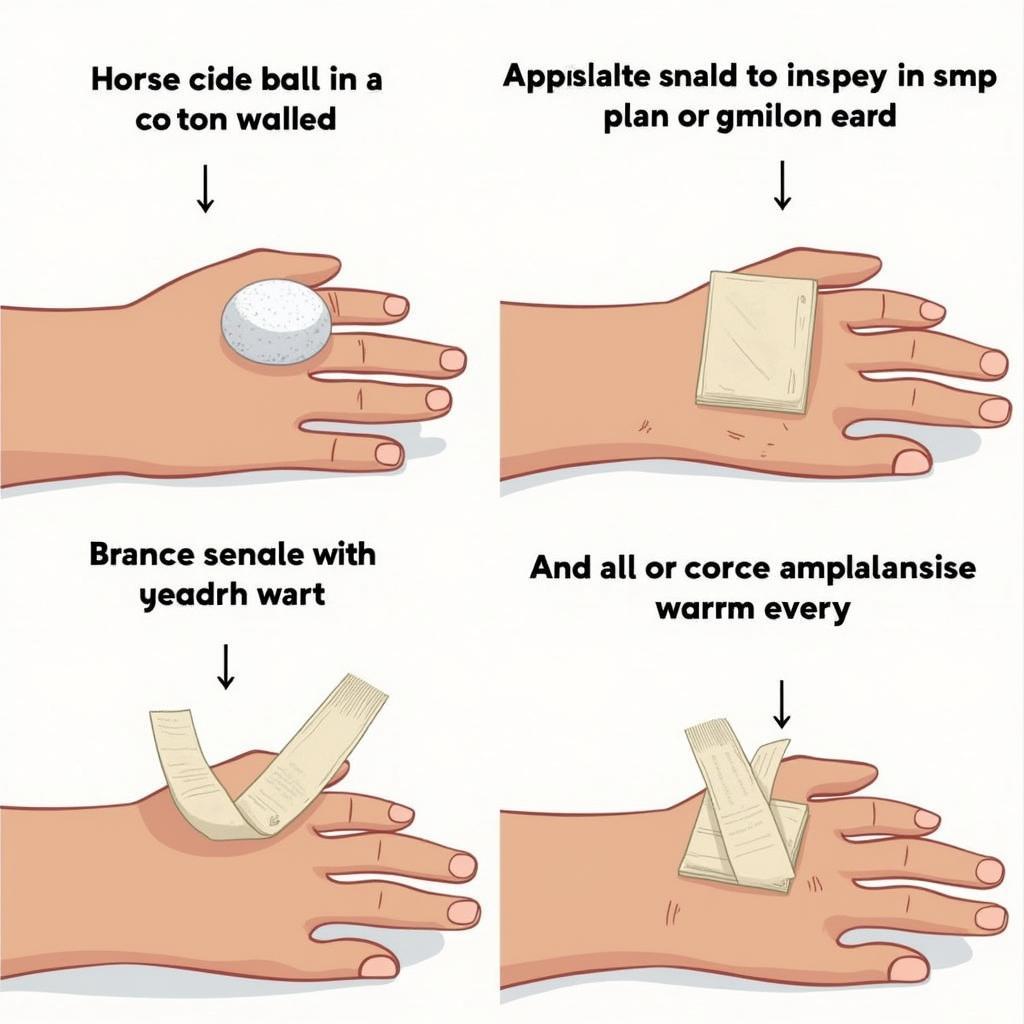Dealing with stubborn horse warts? Home Remedies For Horse Warts can offer a practical first approach. Understanding the causes, types, and available home treatment options can help you manage these common equine skin growths effectively.
Understanding Horse Warts
Horse warts, also known as equine sarcoids, are benign skin tumors caused by the bovine papillomavirus (BPV). They can appear anywhere on a horse’s body, but common locations include the face, legs, and genitals. While usually harmless, they can sometimes interfere with tack or become irritated, requiring treatment.
Types of Horse Warts
Several types of equine sarcoids exist, each with distinct characteristics:
- Occult sarcoids: These appear as flat, scaly, or slightly raised lesions.
- Verrucous sarcoids: Resembling cauliflower-like growths, these warts are often gray or pink.
- Nodular sarcoids: Firm, round nodules found under the skin, these can sometimes ulcerate.
- Fibroblastic sarcoids: These aggressive sarcoids appear as fleshy, rapidly growing masses, often bleeding easily.
- Mixed sarcoids: Exhibiting characteristics of multiple sarcoid types.
Home Remedies for Horse Warts: A Cautious Approach
Several home remedies are touted for treating horse warts. While some anecdotal evidence suggests they can be effective, it’s crucial to consult with a veterinarian before trying any home treatment, as some methods can cause irritation or worsen the condition. Always prioritize your horse’s well-being and seek professional advice.
Apple Cider Vinegar
Apple cider vinegar’s acidic properties are believed to help dry out and shrink warts. Soaking a cotton ball in apple cider vinegar and applying it directly to the wart, secured with a bandage, is a common method. This should be done daily for several weeks.
Garlic
Garlic possesses antiviral properties that may be beneficial in treating viral warts. Crushed garlic can be applied directly to the wart or mixed with a carrier oil like coconut oil. Monitor for any signs of skin irritation.
 Applying Apple Cider Vinegar to a Horse Wart
Applying Apple Cider Vinegar to a Horse Wart
Thuja Oil
Derived from the Thuja tree, this essential oil is known for its antiviral and immune-boosting properties. It should be diluted with a carrier oil before applying to the wart, as it can be potent.
Bloodroot Paste
Bloodroot paste is a commercially available topical treatment containing sanguinarine, an alkaloid with purported anti-tumor effects. It’s considered a more potent option and requires careful application following product instructions.
When to Consult a Veterinarian
While home remedies can be a starting point, veterinary intervention is often necessary, particularly for large, rapidly growing, or bleeding warts. A veterinarian can accurately diagnose the type of sarcoid and recommend the most appropriate treatment strategy.
Veterinary Treatment Options
Veterarians have a range of treatment options at their disposal, including:
- Cryotherapy: Freezing the wart with liquid nitrogen.
- Surgical removal: Excising the wart surgically.
- Laser surgery: Using a laser to remove the wart.
- Immunotherapy: Stimulating the horse’s immune system to fight the virus.
- Chemotherapy: Using topical or injectable medications to destroy the wart cells.
Conclusion
Home remedies for horse warts can be considered as a preliminary approach, but it’s imperative to consult your veterinarian for accurate diagnosis and guidance. While some home remedies may offer relief, veterinary intervention often provides the most effective and safe solutions for managing equine sarcoids. Early diagnosis and appropriate treatment are crucial for preventing complications and ensuring your horse’s well-being.
FAQ
- Are all horse warts caused by the same virus? (Yes, equine sarcoids are primarily caused by bovine papillomavirus.)
- Can horse warts spread to humans? (No, equine sarcoids are species-specific and do not pose a risk to humans.)
- Are all horse warts cancerous? (No, equine sarcoids are generally benign, but some types can be locally aggressive.)
- How long does it take for home remedies to work on horse warts? (Results can vary, but it can take several weeks or even months to see any noticeable changes.)
- Can I prevent my horse from getting warts? (While there’s no guaranteed prevention, maintaining good hygiene and boosting your horse’s immune system can help.)
- Are there any side effects to home remedies for horse warts? (Some home remedies can cause skin irritation or allergic reactions, so it’s crucial to monitor your horse closely.)
- What is the most effective treatment for horse warts? (The most effective treatment depends on the type and location of the sarcoid and is best determined by a veterinarian.)
Need more help? Check out our other articles on horse health and care:
- Equine Skin Conditions: A Comprehensive Guide
- Boosting Your Horse’s Immune System Naturally
When you need support, contact us: Phone: 0772127271, Email: [email protected] Or visit us at: QGM2+WX2, Vị Trung, Vị Thuỷ, Hậu Giang, Việt Nam. We have a 24/7 customer service team.